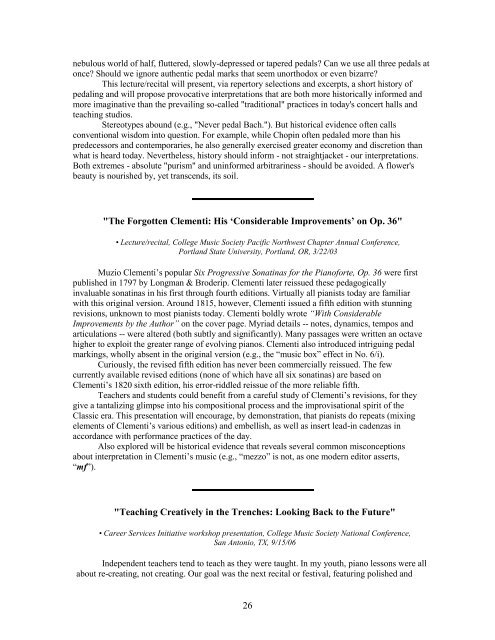ARTHUR HOULE Pianist EDUCATION D. M. A. Piano Performance ...
ARTHUR HOULE Pianist EDUCATION D. M. A. Piano Performance ...
ARTHUR HOULE Pianist EDUCATION D. M. A. Piano Performance ...
You also want an ePaper? Increase the reach of your titles
YUMPU automatically turns print PDFs into web optimized ePapers that Google loves.
nebulous world of half, fluttered, slowly-depressed or tapered pedals? Can we use all three pedals at<br />
once? Should we ignore authentic pedal marks that seem unorthodox or even bizarre?<br />
This lecture/recital will present, via repertory selections and excerpts, a short history of<br />
pedaling and will propose provocative interpretations that are both more historically informed and<br />
more imaginative than the prevailing so-called "traditional" practices in today's concert halls and<br />
teaching studios.<br />
Stereotypes abound (e.g., "Never pedal Bach."). But historical evidence often calls<br />
conventional wisdom into question. For example, while Chopin often pedaled more than his<br />
predecessors and contemporaries, he also generally exercised greater economy and discretion than<br />
what is heard today. Nevertheless, history should inform - not straightjacket - our interpretations.<br />
Both extremes - absolute "purism" and uninformed arbitrariness - should be avoided. A flower's<br />
beauty is nourished by, yet transcends, its soil.<br />
_________________________<br />
"The Forgotten Clementi: His ‘Considerable Improvements’ on Op. 36"<br />
• Lecture/recital, College Music Society Pacific Northwest Chapter Annual Conference,<br />
Portland State University, Portland, OR, 3/22/03<br />
Muzio Clementi’s popular Six Progressive Sonatinas for the <strong>Piano</strong>forte, Op. 36 were first<br />
published in 1797 by Longman & Broderip. Clementi later reissued these pedagogically<br />
invaluable sonatinas in his first through fourth editions. Virtually all pianists today are familiar<br />
with this original version. Around 1815, however, Clementi issued a fifth edition with stunning<br />
revisions, unknown to most pianists today. Clementi boldly wrote “With Considerable<br />
Improvements by the Author” on the cover page. Myriad details -- notes, dynamics, tempos and<br />
articulations -- were altered (both subtly and significantly). Many passages were written an octave<br />
higher to exploit the greater range of evolving pianos. Clementi also introduced intriguing pedal<br />
markings, wholly absent in the original version (e.g., the “music box” effect in No. 6/i).<br />
Curiously, the revised fifth edition has never been commercially reissued. The few<br />
currently available revised editions (none of which have all six sonatinas) are based on<br />
Clementi’s 1820 sixth edition, his error-riddled reissue of the more reliable fifth.<br />
Teachers and students could benefit from a careful study of Clementi’s revisions, for they<br />
give a tantalizing glimpse into his compositional process and the improvisational spirit of the<br />
Classic era. This presentation will encourage, by demonstration, that pianists do repeats (mixing<br />
elements of Clementi’s various editions) and embellish, as well as insert lead-in cadenzas in<br />
accordance with performance practices of the day.<br />
Also explored will be historical evidence that reveals several common misconceptions<br />
about interpretation in Clementi’s music (e.g., “mezzo” is not, as one modern editor asserts,<br />
“mf”).<br />
_________________________<br />
"Teaching Creatively in the Trenches: Looking Back to the Future"<br />
• Career Services Initiative workshop presentation, College Music Society National Conference,<br />
San Antonio, TX, 9/15/06<br />
Independent teachers tend to teach as they were taught. In my youth, piano lessons were all<br />
about re-creating, not creating. Our goal was the next recital or festival, featuring polished and<br />
26


